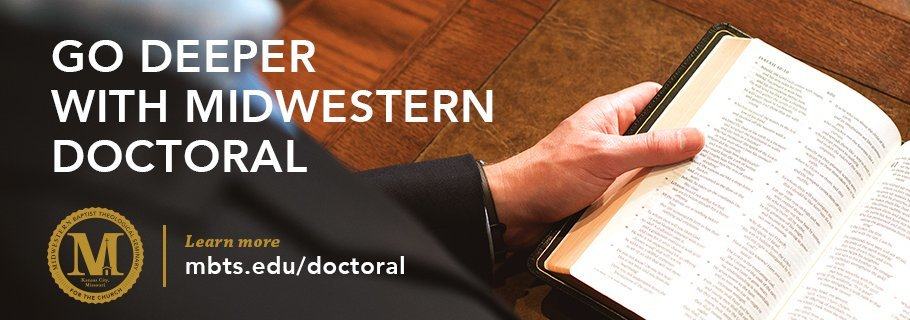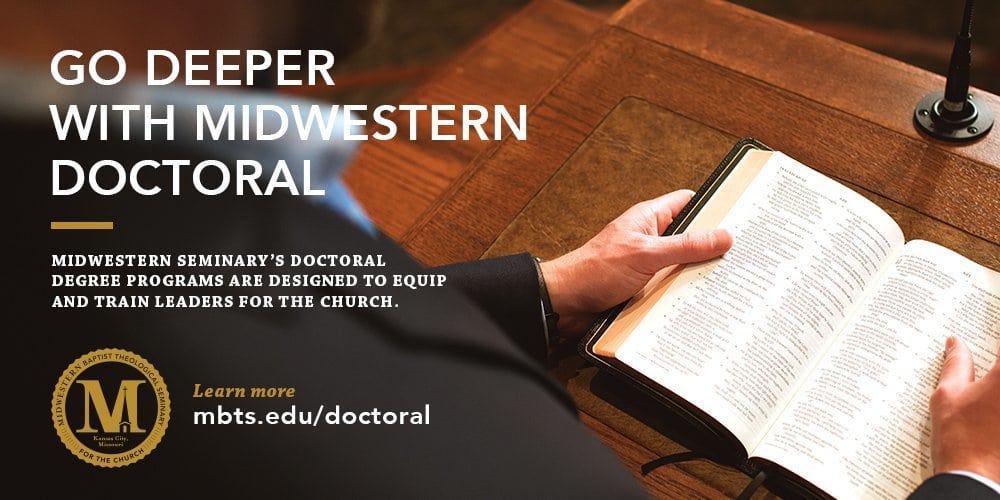This sponsored post was prepared by Dr. Todd Chipman of Midwestern Baptist Theological Seminary.
If you’ve ever wondered whether pursuing a Ph.D. in your theological training would be worth it, there are lots of factors to consider aside from wondering how it might impact your career aspirations. If you’re sorting through whether Ph.D studies are for you, think and pray through the following questions.
1. Can you be single-minded and voracious in your studies?
The Ph.D allows students to devote their time to a specific area of interest, mastering its content. The Ph.D curriculum becomes an all-you-can eat buffet. Some dishes are tasty and some will not get a second helping, but the student makes the choices and discovers the tastes for himself. And there is joy here. For the student who, after completing the Master’s degree, yet finds himself wandering the library, combing the bibliographies of his favorite books, the Ph.D is for him.
2. Are you prepared to expand your understanding to wider contexts?
As a student engages the content specific to his area of research, be becomes aware that all literature — not just the New or Old Testament — has a context. In the Ph.D program, seminars and directed studies aim to help the student engage a content domain with a view to understanding the broad scope of that literature: why it was written, when it was written; specific authors and texts in conversation with other specific authors and texts. Investigating the context of a specific content domain often launches the student to his dissertation issue but can also equip the student to engage a number of issues related to that sphere of literature.
For instance, my dissertation is an investigation of the background and worldview that might explain the Epistle to the Hebrews. Studying the background of Hebrews specifically required me to study the literature of the ancient world, both Greco-Roman and Jewish, generally. I learned to read through — as opposed to skipping around in — many of the Dead Sea Scrolls and Roman historians. One of the more famous historians is Suetonius and his Lives of the Caesars, biographies of twelve Roman Emperors from Julius Caesar to Domitian. Suetonius provides much of what we know about these Roman leaders; like any good biographer Suetonius sketches their greatness and weaknesses.
This kind of background knowledge, sensitivity to context of literature, equips the student to disarm arguments that might skew these background sources. If you’re not prepared to go deep and wide, Ph.D studies may not be for you.
3. Will you commit to academic rigor while maintaining devotional affection?
Here I speak personally. For me, engaging the Dead Sea Scrolls, apocryphal and pseudepigraphal texts, and Greco-Roman historians — while meditating on Hebrews in Greek — settled in my mind that the authors of the New Testament distinguished themselves from authors of other literature: they understood the answers to life’s quest to have arrived in Jesus. Jesus’s death and resurrection fulfilled humanity’s great longing for liberation — a theme common to nearly all background texts. As God in the flesh, Jesus defeated the great enemy of humanity, the devil, and assured eternal life with God for His followers. The quest of the ages had been fulfilled in Jesus Christ. Keeping him in focus allowed my studies to fuel for my affections for Christ. If all you’re pursuing is a degree and not a greater devotion to Christ through it, I would caution you in your doctoral ambitions.
4. Will you place your confidence in the gospel and not in your career options?
In my case, Content led to Context, and Context to Conviction. And Conviction was followed by Confidence. I shared in an MBTS chapel sermon that completing the Ph.D made me a better pastor because I now enjoy greater confidence in the New Testament. I am able to deal more aptly with those who doubt its integrity; I can disarm the skeptics because I understand the world of the New Testament and its literary background. Because I know Content and Context I am equipped to explain the message of the New Testament. In my mind, the burden of proof has been shifted from me to those who opposed the New Testament and the message of Jesus. It is in this sense that the Ph.D is widely valuable.
Few are the jobs to teach professionally in a Christian college or seminary. But if the PhD is done well, the student will not worry about getting a job because he will be useful in whatever capacity God has him.
And there are a few other factors that should give potential Ph.D students pause:
5. Is your family ready?
If a student’s spouse is not well and supportive, his marriage will take a hit. The Ph.D demands extra time and long hours and personal discipline that can escalate the tensions of life. If the student is a man and is not leading wife and children spirituality then the Ph.D will be of little value.
6. Is your fellowship supportive?
Most Ph.D students enrolling in an evangelical institution are serving in a church in some capacity. And the Ph.D curriculum will infringe upon time and energy the church might be expecting to be theirs. Thus the student must be open with the church about his desires and help the leaders around him to understand the value the Ph.D will bring to the church as a whole. Best to sell the Ph.D to a church and then let them enjoy the fruit of it.
7. Is it financially viable?
Tuition is costly, and books and materials will need to be purchased as well. If the student is not financially sound, the bills can cause tensions on family and church. God provides but the student must be wise to discern the costs involved in higher education.
More could be said, but these factors provide a frame for discerning God’s direction.
Learn more about Midwestern Seminary’s various doctoral options, both modular and residential, including The Residency, our enhanced residential Ph.D component.
Dr. Todd Chipman has been the Pastor for Discipleship at The Master’s Community Church in Kansas City, Kansas since 2000. He also serves as an Assistant Professor of Biblical Studies at Midwestern Baptist Theological Seminary.











